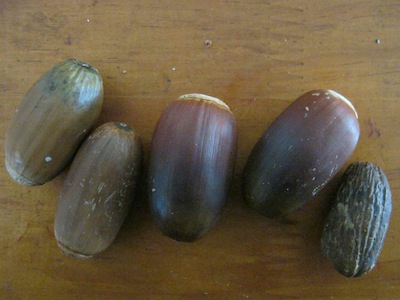Dear Reader, in this age of AI created content, please support with your goodwill someone who works harder to provide the human-made. Sign up in the righthand column or bottom of this page. You will receive my hand illustrated monthly newsletter RESTORE NATURE and access to the biodiversity garden design course as I write...and nothing else, I respect your time.
what to do with these acorns ?
by Caroline
(Cape Town)

Quercus ilex (cork oak) acorns, the two fat smooth ones seem to be good still, and may give a tree for free...made for dry summers in the Mediterranean
I have recently started reading a very informative book for gardening in dry winter rainfall areas, Mediterranean Gardening: a Waterwise Approach by Heidi Gildemeister. It was available at or local library. This encouraged me to think "Mediterranean" and it also confirmed many of my observations and garden practices for saving water. So for my next plantings its going to be more olives, a grape vine, and some medicinals, such as Hypericum, as well as expeditions to the best native plant nursery in our area, down at Cape Point, of Drake-ulean fame.
I found a cork oak while walking the dog and have started collecting fresh acorns each time I pass by, as I have read they should be planted quickly after dropping. Place them lying horizontally in a pot, and cover with 1cm of soil. Now, our Cape winter, is the best time for sowing and indeed for harvesting the seeds, as they are falling at the moment. Sow them fresh because they deteriorate quickly, and water them thoroughly. They should take 2 to 4 weeks to emerge. I will keep you posted.
I'm excited about this as the cork oak is drought resistant (built for it with its thick water impermeable cork bark and short stature) has a permanent green canopy to hide a certain neighbour's garage roof edge, is useful and a vital part of the terminal Mediterranean plant ecosystem, cork oak forest. Most of the Mediterranean Riviera was once cork oak or umbrella pine forest. Here in the South there was a lot more, very fragile indigenous Afromontaine forest, in the ravines where it had permanent water and shelter from fire. Many of the native trees have medicinal value but I've tried growing the seed and germination is very low. I need to learn a lot more to be able to grow our locally regional varieties that aren't in public or commercial nurseries.
Olives however, the wild variety, are indigenous here, so there need be no qualms about planting the horticulturized large fruit bearing kind.
Comments for what to do with these acorns ?
|
||
|
||
|
||
SEARCH
Order the Kindle E-book for the SPECIAL PRICE of only
Prices valid till 30.09.2023
Recent Articles
-
Geography Research Task
Jan 31, 25 11:37 PM
To whom it may concern My name is Tanyaradzwa Madziwa and I am a matric student at Springfield Convent School. As part of our geography syllabus for this -
Eco Long Drop Pit Latrines Uganda
Nov 29, 24 02:45 AM
Good evening from the UK. My name is Murray Kirkham and I am the chairman of the International and foundation committee of my local Lindum Lincoln Rotary -
Landscape Architect
Oct 01, 24 10:42 AM
I so appreciate your informative description! Your experimentation and curiosity with the seeds, germination, and rearing of the maggot are exciting to
"How to start a profitable worm business on a shoestring budget
Order a printed copy from "Amazon" at the SPECIAL PRICE of only
or a digital version from the "Kindle" store at the SPECIAL PRICE of only
Prices valid till 30.09.2023






